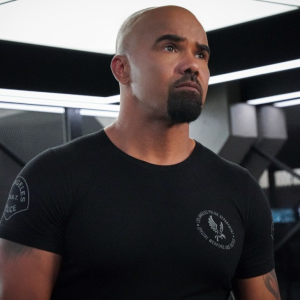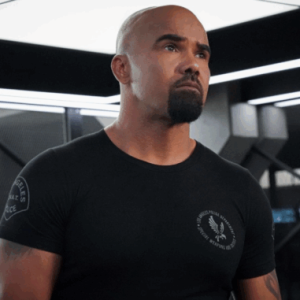The conclusion of CBS’s S.W.A.T. after seven action-packed seasons was an emotional event, deeply felt by its dedicated fanbase, the cast, and the crew who poured their efforts into the popular police procedural. However, the emotional farewell quickly shifted to a complex narrative of new beginnings and perceived betrayals as CBS announced a spin-off, prominently featuring series star Shemar Moore, who portrays the charismatic Sergeant Daniel “Hondo” Harrelson. While this development promises to extend the S.W.A.T. legacy, not everyone from the original team is celebrating. Actor David Lim, who masterfully brought Officer Victor Tan to life for the entirety of the series, has openly expressed his profound disappointment and the “sting” of exclusion, igniting a fervent discussion across the S.W.A.T. fandom about loyalty, creative direction, and the treatment of integral cast members.
Lim’s candid remarks, made during an interview with TV Insider, resonated deeply with viewers and industry observers alike. “When you give your all to something for so long and you’re not part of the next chapter, it stings. Of course it does,” he articulated, capturing a universal sentiment of feeling sidelined after significant investment. His honesty cuts beyond typical industry platitudes, connecting with anyone who has committed their heart and soul to a team or project, only to find themselves outside its future evolution.
To understand the magnitude of this sentiment, it’s crucial to recall the journey of the S.W.A.T. series. Launched in 2017, the show quickly carved out its niche with a compelling blend of high-octane action, intricate tactical operations, and poignant character-driven narratives that often explored complex social issues. At its core, S.W.A.T. was a show about family – the chosen family of an elite LAPD unit, led by Hondo, dedicated to protecting Los Angeles. Each team member, including Tan, Deacon Kay (Jay Harrington), Chris Alonso (Lina Esco), and Street (Alex Russell), brought a unique dynamic, creating a cohesive unit whose camaraderie was as vital to the show’s appeal as its explosive action sequences. The series famously faced an unexpected cancellation in 2023 after its sixth season, only for a massive fan outcry, amplified by Shemar Moore himself, to prompt CBS to reverse its decision, greenlighting a seventh and final season. This rollercoaster of emotions, from despair to triumph, only amplified the bond between the audience and the show’s ensemble.

The news of the spin-off, focusing solely on Hondo and promising a “fresh take” with “younger recruits, a darker tone, and a new city,” feels particularly stark against this backdrop. While a natural progression for a popular character, the stark absence of most original cast members, specifically David Lim, poses a significant creative and emotional challenge. For seven seasons, Victor Tan was far more than just a background character. He was a foundational member of the team, embodying loyalty, resilience, and a quiet, unassuming strength. Tan’s character arc saw him evolve from a former vice officer with a complicated past into a reliable, integral part of the S.W.A.T. unit. His journey involved deeply personal storylines, from navigating challenges in his marriage to confronting past mistakes, all while consistently performing under pressure in tense hostage situations and high-stakes operations. His consistent presence and development earned him a significant place in the hearts of the S.W.A.T. faithful, making his complete exclusion from any spin-off discussions particularly baffling and frustrating for fans.
The question of why Lim was left out remains unanswered. While no personal rift between Moore and Lim has been suggested, Lim’s comments hint at a broader lack of communication or a sense of closure, characteristic of Hollywood’s often impersonal decision-making processes. “I’ve got nothing but respect for Shemar,” Lim stated, underscoring the professional nature of his disappointment. Shemar Moore, who is set to star in and executive produce the new series, has yet to publicly address Lim’s remarks, leading many to speculate whether the decision to exclude the original cast stemmed primarily from CBS’s strategic vision for a new, potentially lower-budgeted narrative, or if Moore played a role in the creative direction.
The fan response to Lim’s revelation has been immediate and emphatic. Social media platforms, the very same arenas where the SaveSWAT campaign once roared to life, are now alight with messages of solidarity. “No Tan, no watch,” declared one fan, a sentiment echoed by countless others demanding that the spin-off honor the original team or risk alienating its most loyal viewers. The hashtag JusticeForTan is gaining momentum, a clear signal that fans expect their beloved characters to receive the recognition and continuity they believe they deserve.

Indeed, the world of television spin-offs is often fraught with strategic and financial considerations. New casts, reduced budgets, and a desire for “fresh appeal” frequently dictate such creative shifts. However, this pragmatic approach often overlooks the deep emotional investment audiences have in established characters and the actors who portray them. Veteran actors, despite their integral contributions to a show’s success, are sometimes sidelined in favor of younger talent or new narrative directions, a harsh reality of the entertainment industry that rarely prioritizes sentimentality.
Despite the obvious sting of exclusion, David Lim has approached the situation with remarkable grace. He has consistently expressed pride in his seven seasons on S.W.A.T. and immense gratitude for the unwavering support of the fans. “The show gave me so much. I’ll always carry that with me,” he affirmed, indicating a dignified closure to that chapter of his career. Lim is already exploring new opportunities, hinting at an upcoming project that promises to be “very different” from his S.W.A.T. persona, signaling his readiness to move forward.
Nonetheless, the exclusion of key cast members undoubtedly casts a long shadow over the new S.W.A.T. project. The success of the original series was built on the palpable chemistry and emotional depth of its ensemble. Without the familiar faces and the established camaraderie that defined the team, the spin-off faces the considerable challenge of recreating that unique blend of action and heart. As the central figure and an executive producer, Shemar Moore will bear the significant burden of navigating this delicate balance – evolving the franchise while maintaining a sense of loyalty to its foundational elements. While the immediate plans for Victor Tan’s return may be non-existent, the dynamic nature of television, coupled with passionate fan movements, means that a cameo, a flashback, or even a late-season return for fan-favorite characters can never be entirely ruled out if the creators are truly listening to their audience.

Ultimately, David Lim’s candid observations serve as a powerful reminder: spin-offs, to truly succeed, must honor the legacy from which they emerge. Characters like Victor Tan were not mere filler; they became an integral part of the S.W.A.T. family for millions of viewers. To erase such figures without proper acknowledgment or continuation risks severing the emotional connection that made the original show so special. While Shemar Moore’s new chapter is filled with potential, the palpable absence of familiar faces like Tan leaves a noticeable void, prompting fans to question if the heart of S.W.A.T. – its unwavering focus on the team – can truly beat as strongly when all its vital parts are not present.





